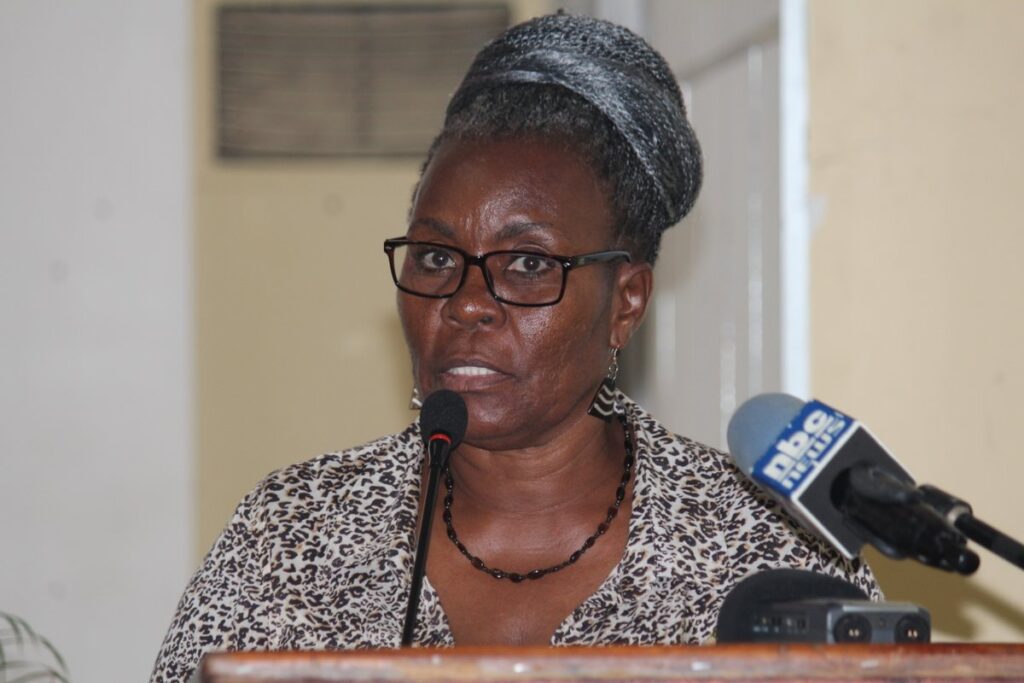
By: Uakutura Kambaekua
The Ministry of Education Arts and Culture on Tuesday undertook a regional visit to the Kunene region to consult various stakeholders on the National Conference on Education and the Transforming Education Summit to draw up a comprehensive country report that encompasses the dreams of all the broader stakeholders.
The United Nations Secretary-General will convene the Transforming Education Summit (TES) on 19 September 2022 during the 77th UN General Assembly.
The summit seeks to mobilise political ambition, solutions and solidarity to transform education, take stock to recover pandemic-related learning losses, reimagine systems for the world of today and tomorrow and revitalise national and global efforts to achieve Sustainable Development Goal 4 (SDG 4).
During the consultation meeting, Education minister Anna Ester Nghipondoka stated that for the country to achieve these objectives, inclusive dialogues and meaningful engagements
across the complete set of stakeholders, particularly the young people, students and teachers, are required.
“We intend that this national dialogue ensures meaningful engagement beyond government, hence the broad spectrum of representation,” she said.
“Our purpose in facilitating the regional consultations aligns with the pre-summit objective to harness (connect) evolving discussions on transforming education, elaborate initial content for the
summit, and generate momentum up to September. The process leading up to September provides an opportunity for us to put education at the centre of the political debate,” added Nghipondoka.
According to the minister, the Transforming Education Summit (TES) is based on five thematic tracks which must be taken into consideration during this regional consultation process, namely: inclusive, equitable, safe and healthy schools, learning and skills for life, work and sustainable development, digital learning and transformation, teachers, teaching and the teaching profession, and, financing of education.
She said these Action Tracks aim to place a spotlight on (lift out) areas that require greater attention (low hanging fruit) and action and that can accelerate progress on education and the 2030 Agenda and transform education.
“The changes that the Action Tracks seek to promote should encompass (incorporate the immediate needs to be tackled (especially the recovery from the COVID-19 pandemic); medium-term; changes needed to advance on SDG 4, and the transformations needed in education systems and societies in a longer-term. Each action track will be co-led by two member states and one leading
stakeholder, with substantive support provided by the UN support team,” said Nghipondoka.
Namibia and Italy co-lead for thematic action track 1 (Inclusive, equitable, safe, and healthy schools), with the SDG 4 Youth Network co-lead stakeholder.
Moreover, Nghipondoka noted that such a consultation process would result in the country compiling a National Statement of Commitment which will outline critical actions for the transformation of education.
“In so doing, we need to pay careful attention to questions such as; what targeted actions have been identified to ensure full recovery from the COVID -19 educational disruptions, what innovative approaches have been identified as levers for game-changing transformations of education policies and practice in the medium and long term, what are revisions that need to be made regarding national targets and benchmarks to reflect the higher level of ambition required for recovery from the COVID-19 crisis and acceleration towards the achievement of SDG 4, what are possible
measures to make public financing of education efficient, adequate and sustainable,” added the minister.
Nghipondoka reiterated that the summit could not have come at a better time because “as we speak, our world is experiencing a global crisis that deprives millions of children of their right to quality education and leaving the Post 2015 Agenda of the United Nations off-track”.
“Therefore, the urgency in transforming education has become increasingly evident in the wake of the COVID-19 educational disruption, which further exacerbated inequities in education. Our country’s situation is unique and shaped by our local context. However, we live in a global village and are required to respond globally in the transformation of education to achieve our goals and the 2030 Agenda,” noted Nghipondoka.
The country’s National Education Conference is set for August 2022, ten (10) years since the 2011 National Conference on Education, which aimed to improve and reform the education system.
The conference took place from 27 June to l8 July 2011 under the theme Collective delivery on the education promise: improving the education system for quality learning outcomes and quality of life.
The conference holistically covered the entire education system: from early childhood development, pre primary, secondary education, vocational education and training; to higher education and adult and lifelong learning. The conference was attended by more than 1 000 participants from all 13 regions. Participants included education experts, traditional leaders, religious leaders, NGOs, learners, students, teachers and members of the school management teams representing various management and implementation levels.
The objectives of the conference, according to Nghipondoka, are, amongst others, to review/re-assess the extent to which the resolutions and directives of the 2011 National Conference on Education System over the past decade to understand the past, appreciate the present and inform the future; enable participants to demonstrate an understanding of sustainable policy practices and challenges related to inclusive education provision; share opportunities, achievements, constraints and interventions associated with the implementation of the Ministry’s Strategic Plans for 2012-17 and 2017- 2022; assess the extent to which the reformed curriculum was implemented: rationale, opportunities, achievement and challenges (also concerning the
the outbreak of the Covid-19 pandemic), learn from progressive initiatives and practices from others at local (school/regions), regional (SADC) and international levels; develop a common and shared understanding of free education in the Namibian context concerning rationale, policy
interpretation, challenges and opportunities; develop a shared understanding of the ECD transfer activities from MGECWF to MoEAC, and generate recommendations to inform the next Strategic Plan for 2023- 2028.
She further called on all participants to engage critically during the group discussions to ensure that they are responsive to their circumstances and reimagine the futures of education globally.









Comments